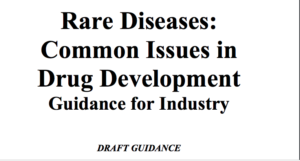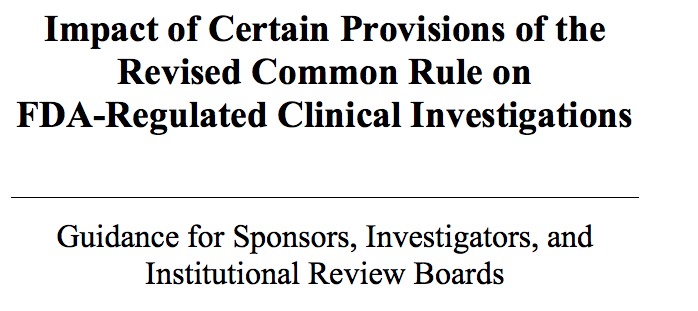In a final guidance issued last week, “Expedited Programs for Regenerative Medicine Therapies for Serious Conditions”, regulators are promising flexibility in clinical trial design for stem cell therapies in rare diseases. The FDA is also promising to be flexible about fast-tracking some potential stem cell treatments. (CenterWatch)
New FDA Guidance: The Least Burdensome Provisions
 This guidance document replaces the Center for Devices and Radiological Health (CDRH)’s 2002 Least Burdensome Guidance. It defines “least burdensome” to be the minimum amount of information necessary to adequately address a relevant regulatory question or issue through the most efficient manner at the right time. (fda.gov)
This guidance document replaces the Center for Devices and Radiological Health (CDRH)’s 2002 Least Burdensome Guidance. It defines “least burdensome” to be the minimum amount of information necessary to adequately address a relevant regulatory question or issue through the most efficient manner at the right time. (fda.gov)
New FDA Guidance. February 2019
 The purpose of this guidance is to assist sponsors of drug and biological products for the treatment or prevention of rare diseases in conducting more efficient and successful drug development programs. Although the statutory requirements for marketing approval for drugs to treat rare and common diseases are the same and issues discussed here are encountered in other drug development programs, these issues are frequently more difficult to address in the context of a rare disease. (fda.gov)
The purpose of this guidance is to assist sponsors of drug and biological products for the treatment or prevention of rare diseases in conducting more efficient and successful drug development programs. Although the statutory requirements for marketing approval for drugs to treat rare and common diseases are the same and issues discussed here are encountered in other drug development programs, these issues are frequently more difficult to address in the context of a rare disease. (fda.gov)
New FDA Guidance outlines principles for meta-analyses evaluating drug safety
 FDA’s evaluation of the safety of drug products often requires combining and summarizing information from multiple sources, and meta-analysis is a useful tool for this purpose. This document provides guidance on the use of meta-analyses of randomized controlled clinical trials (RCTs) to evaluate the safety of human drugs or biological products in the context of FDA’s regulatory decision-making. (fda.gov)
FDA’s evaluation of the safety of drug products often requires combining and summarizing information from multiple sources, and meta-analysis is a useful tool for this purpose. This document provides guidance on the use of meta-analyses of randomized controlled clinical trials (RCTs) to evaluate the safety of human drugs or biological products in the context of FDA’s regulatory decision-making. (fda.gov)
FDA issues new human subjects guidance
 The final rule (January 2017), which made revisions to the Department of Health and Human Services (HHS) human subject requirements (“Common Rule”), resulted in differences between HHS and FDA human subject regulations. FDA intends to revise its clinical investigation regulations to harmonize them with HHS. In the interim, the FDA has issued a new guidance for sponsors whose investigations must meet both FDA and HHS compliance requirements. (emergobyul.com)
The final rule (January 2017), which made revisions to the Department of Health and Human Services (HHS) human subject requirements (“Common Rule”), resulted in differences between HHS and FDA human subject regulations. FDA intends to revise its clinical investigation regulations to harmonize them with HHS. In the interim, the FDA has issued a new guidance for sponsors whose investigations must meet both FDA and HHS compliance requirements. (emergobyul.com)
FDA Commissioner announces new guidance to make drug development more efficient
 According to Scott Gottlieb, M.D., FDA Commissioner, one of the most promising ways to make drug development more efficient is by developing the science around innovative approaches to the design of clinical trials. Here Gottlieb introduces two new Guidance documents intended to do this – “Hematologic Malignancies: Regulatory Considerations for Use of Minimal Residual Disease in Development of Drug and Biological Products for Treatment” and “Developing Targeted Therapies in Low-Frequency Molecular Subsets of a Disease.” (medcitynews.com)
According to Scott Gottlieb, M.D., FDA Commissioner, one of the most promising ways to make drug development more efficient is by developing the science around innovative approaches to the design of clinical trials. Here Gottlieb introduces two new Guidance documents intended to do this – “Hematologic Malignancies: Regulatory Considerations for Use of Minimal Residual Disease in Development of Drug and Biological Products for Treatment” and “Developing Targeted Therapies in Low-Frequency Molecular Subsets of a Disease.” (medcitynews.com)
Adaptive Designs for Clinical Trials of Drugs and Biologics. DRAFT GUIDANCE
September 2018 A summarized version of this DRAFT GUIDANCE- by Teresa Gallagher This document provides guidance to sponsors and applicants submitting investigational new drug applications (INDs), new drug applications (NDAs), biologics licensing applications (BLAs), or supplemental applications on the appropriate use of adaptive designs for clinical trials to provide evidence Read more
